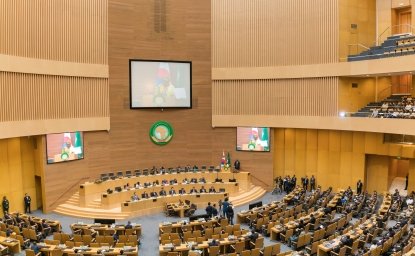
A blog of the Africa Program
[caption id="attachment_11976" align="aligncenter" width="640"] Photo by weesam2010, via Flickr. Creative Commons.[/caption]
There is a growing interest among African policymakers in the demographic dividend, the economic growth unleashed when a society shifts from an age structure dominated by child dependents to one with a greater proportion of working-age adults. This interest in the demographic dividend is one factor for why there is a new optimism for fertility decline in Africa. Voluntary fertility decline is a critical factor in creating a demographic dividend, as I have written about. However, the difficult discussion on the need for fertility decline has been sidelined in favor of other, related issues like investment in youth. While these are important topics, if African countries really want to harness the demographic dividend, they must acknowledge fertility as the number one challenge to sustainable development and direct their investments accordingly.
The Promise of the Demographic Dividend
If there is a region where the paradigm of the demographic dividend has gained heightened recognition and momentum, it is Africa. Harnessing the demographic dividend is seen by many experts and policymakers as the best path towards meeting the development objectives of the continent. The experience of East Asian countries speaks to the additional economic growth that may be achieved if countries reduce fertility and invest in their human capital, specifically by ensuring quality education, health care, and gainful employment.
Many countries across Africa are already putting in place measures and policies that would help create an enabling environment and position them towards reaping the demographic dividend, including undertaking studies to estimate the level of dividend that they can harness. At the regional level, a continent-wide demographic dividend initiative has been in place since 2013, and the African Union endorsed the demographic dividend as a key framework for achieving the continent's Agenda 2063 and national development aspirations. Most African countries have signed various protocols that culminated in the development of Agenda 2063, and the Common African Position on the Post-2015 Development Agenda. It calls upon countries to conduct in-depth analyses to understand the demographic dividend and provide roadmaps for what countries should do to harness it. The Agenda 2063 and its first ten-year implementation plan, seeks to transform Africa into an "integrated, prosperous and peaceful Africa, driven by its own Citizens and representing a dynamic force in the global arena." The agenda recognizes the role of population dynamics in this transformation and specifically seeks to unleash the full potential of youth and women to boost socioeconomic development.
The Question of Fertility
These initiatives, coupled with several years of high economic growth rates, create some optimism that African countries can harness the demographic dividend. However, there is reason for concern. All these initiatives ignore the one factor that will decide whether the continent reaps a demographic dividend or a disaster: persistently high fertility. These African Union initiatives do not mention fertility decline even once. Instead, and for many leaders too, addressing the challenges faced by the youthful populations in most African countries has become synonymous with achieving the demographic dividend. These frameworks rightly highlight that young people represent Africa's greatest asset, and that investments made in the youth today will determine the development trajectory of Africa over the next 50 years. However they ignore the crucial fact that youthful populations will continue increasing if fertility does not decline, creating a bigger challenge than is faced currently. If the slow rate of fertility decline continues, the current high dependence rates, higher poverty rates, smaller investments in children in terms of education and health, lower labor productivity, high un- or underemployment, and the risk of political instability will remain the order of the day.
In an earlier article, I wrote about the growing interest in demographic dividend as one factor for why there is a new optimism for fertility decline in Africa. However, talking about investment among the youth has hijacked the discussion on the need for fertility decline in Africa, a controversial topic among African leaders. Currently, most African governments do not have adequate resources to maintain the current levels of investment in health and education, let alone increase the quality of services provided. We need to free up resources to re-invest in the young population, through population age structure change. To do this, fertility decline is a prerequisite. When fertility falls, the cohorts that follow are smaller, lowering the youth dependency ratio and allowing larger investment per child. Without a fertility decline, countries will face an ever-growing population base and ever-larger youth cohorts — and children will be further exposed to health risks, malnutrition, and lower public and private educational investments. Without fertility decline, harnessing the demographic dividend will remain a pipe dream. Except for a few countries in Southern Africa and some of the island nations, African countries tend to have among the world's highest fertility rates. On average, women in Sub-Saharan Africa have about 5 children over their reproductive lifetime, compared to a global average of 2.5 children.
At the country level, the discussion has shifted to harnessing the youth potential, even in countries where demographic dividend studies have been undertaken. This is relevant for some countries, particularly those in the southern African region that have relatively low fertility, like Botswana and South Africa, where the main concern is investing in the youth before the population starts aging. But the starting point for most African countries that still have high fertility should be on encouraging lower fertility, and consequently reducing the young dependency burden. In some countries where AFIDEP has conducted studies, we are categorically instructed not to talk about fertility decline during presentations, less we risk the study report being shelved by the government. Instead we are told to use more acceptable terms like birth spacing. If African countries really want to harness the demographic dividend, it's time that we acknowledge fertility as the number one challenge to sustainable development. Most African countries now have long-term development plans which benchmark their desired level of development in the next 30-40 years to the development levels of the Asian Tigers today. For this to happen, countries have to adapt the investments that drove the unprecedented economic growth among these Asian Tigers, with the first investment areas being related to fertility decline. Merely selecting what we are comfortable in will not cut it.
Africa can enjoy massive dividends, but its leaders have to rise to the occasion. The question that remains is whether Africa can raise the visionary leaders that made the East Asian Tigers create an enabling policy environment for transformational socio-economic growth. The African Union's 2016 demographic dividend roadmap shows broad investment areas for countries to harness the demographic dividend. It highlights that lower fertility is central to economic transformation in the continent, providing some hope that fertility decline has not been totally overlooked. To quote the World Bank's 2015 report, Africa's Demographic Transition: Dividend or Disaster? "Demography may be destiny, but countries can shape policies to try to ensure that this destiny produces a dividend and not a disaster." African countries should take advantage of 2017 to advocate for fertility decline to position the continent towards realizing the "Africa We Want."
Eunice Mueni is a knowledge translation officer at the African Institute for Development Policy (AFIDEP), a member of the Southern Voices Network for Peacebuilding. She was previously a Southern Voices Network Scholar at the Wilson Center.
Author

Africa Program
The Africa Program works to address the most critical issues facing Africa and US-Africa relations, build mutually beneficial US-Africa relations, and enhance knowledge and understanding about Africa in the United States. The Program achieves its mission through in-depth research and analyses, public discussion, working groups, and briefings that bring together policymakers, practitioners, and subject matter experts to analyze and offer practical options for tackling key challenges in Africa and in US-Africa relations. Read more

Explore More in Africa Up Close
Browse Africa Up Close
State Actions, Narratives, and Ethnicity in Kenya



